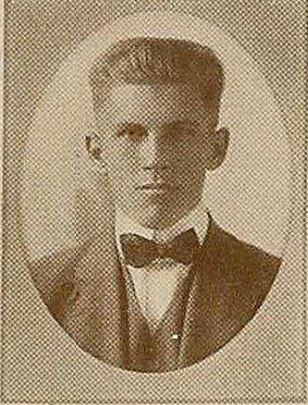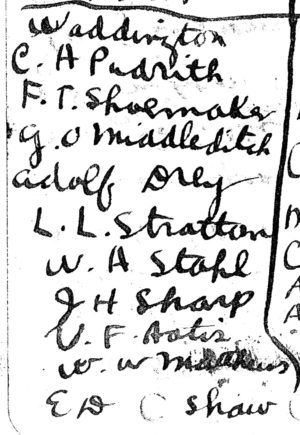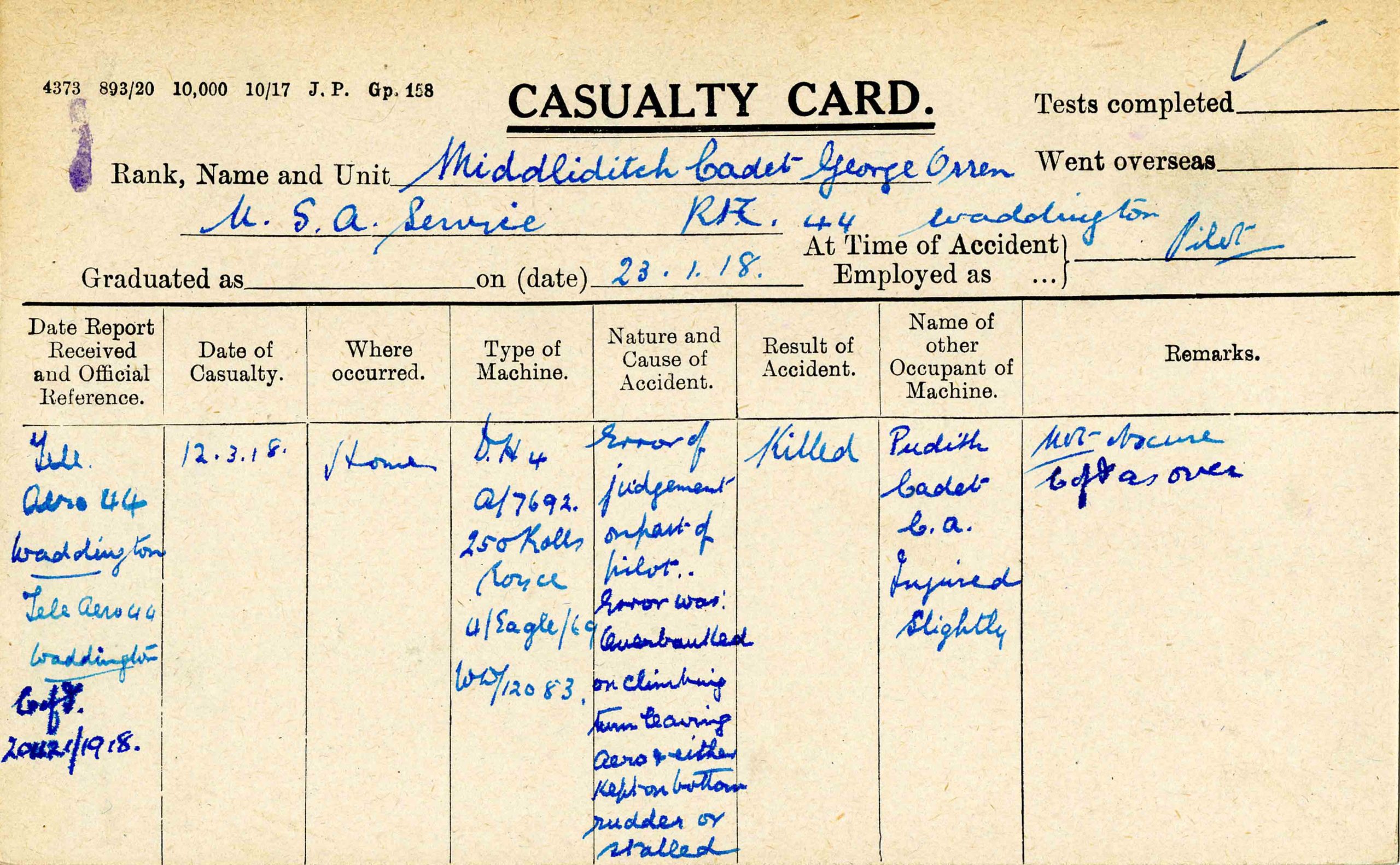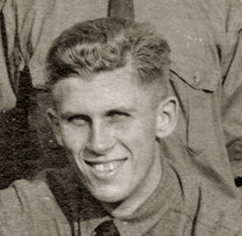(Detroit, Michigan, June 21, 1894 [?] – Lincoln, England, April 30, 1918).1
Pudrith’s paternal grandparents came to the U.S. from Prussia in about 1865, his maternal grandparents from Bavaria in about 1850; both couples had settled in Detroit by 1880. The family name was Pudritzky, but Pudrith’s father, Albert Frederick Pudritzky, changed it shortly before he married Louise Reichrath on August 29, 1893. Chester Albert Pudrith was the oldest of three children and the only son.2

Pudrith attended Detroit Central High School before enrolling at Dartmouth. He excelled in athletics, notably football and crew, and was class president; he received the John Barrett medal for “All-Round Achievement” when he graduated in 1916.3 He returned to Detroit and for a time worked for his father’s roofing company.4 Not long after the U.S. entered the war, Pudrith was admitted to the First Officers’ Training Camp at Fort Sheridan, north of Chicago, where he trained for about two months. He applied and was accepted for the Aviation Section of the Signal Corps, and in early July started ground school at the School of Military Aeronautics at the University of Illinois. A photo kept by Joseph Raymond Payden suggests that he was close to classmates George Orrin Middleditch (also from Detroit) and Vincent Paul Oatis, both of whom had also been at Fort Sheridan.
Pudrith’s class of about thirty men graduated September 1, 1917.5 Most of them, including Pudrith, chose or were chosen to go to Italy for flying training and were thus among the 150 men of the “Italian” or “second Oxford detachment” who sailed from New York for Europe on September 18, 1917, on the Carmania. After a brief stopover at Halifax the Carmania joined a convoy for the voyage across the Atlantic, setting out September 21, 1917. The men were in first class and enjoyed ship board leisure activities, including concerts featuring the violinist Albert Spalding. They also had Italian lessons, conducted by Fiorello La Guardia, and, once they entered dangerous waters, they took turns at submarine watch.
The Carmania docked at Liverpool on October 2, 1917. Not long after this, Pudrith wrote home from Oxford that “Our orders have been changed again and from the way things look now our original plans will not be carried out. We are at the above address for advanced ground school work and will probably be here six or eight weeks.”6 Many of the men were initially unhappy that they were to repeat ground school at the Royal Flying Corps’s No. 2 School of Military Aeronautics at Oxford rather than continuing on to sunny Italy, but Pudrith seems quickly to have made his peace with the situation. “Have had a wonderful lot of experiences the last week. A train ride across England—saw a lot of famous places—talked with a lot of Tommies, etc. We were brought directly here from our boat and were assigned first to ____ College and now to this one.”7 It is unclear who was responsible for deleting the name of the college where Pudrith was housed—perhaps Pudrith himself, wary of censorship, or perhaps the newspaper. Another member of the detachment, Joseph Kirkbride Milnor, described in his diary how on their first night at Oxford the 150 men were distributed among four colleges: Jesus, Exeter, Christ Church, and The Queen’s, and the next day consolidated into two groups assigned to Christ Church and Queen’s; Pudrith was probably in the former.8 In any case, “We managed to have our gang together and I am rooming with George Middleditch, Walt Halley and Warren Teoch [sic: sc. Leach] in one of the dungeons here—built about 1347.”9 All four men had attended ground school at the University of Illinois.
Whereas few of the ground school teachers in the states had actually flown, many of the R.F.C. teachers were experienced pilots: “all the instructors are old flying men and know what they are doing.”10 Nevertheless much of the material covered was already familiar to the cadets, and they did not have to work hard to keep up. Time outside of classes was thus free for them to explore Oxford and the surrounding area. Athletics were also high on the agenda of leisure activities: track, rowing, and on at least one occasion, boxing. The entry for October 22, 1917, in War Birds notes that “We had a boxing-tournament last week. Springs and I went in and won our first bouts, but got knocked out in the second round. Pudrith and Jake Stanley each won in their classes and got a trip to London over the week-end as prizes.”
The anticipated “six to eight weeks” of ground school turned out to be only four, but this, for all but a few of the men, did not mean moving on to flight training. At the beginning of November 1917 the vast majority of the cadets were sent to Harrowby Camp near Grantham in Lincolnshire for a machine gunnery course. As Parr Hooper, also ordered to Grantham, remarked, “It looks like we got sent here because there was no other place to send us to—playing for time.”11

For two weeks the men learned about and practiced on the Vickers machine gun. On their days off, they explored the area around Grantham or went slightly further afield to Nottingham, the nearest large city. John MacGavock Grider kept a photo taken of a group setting out from Grantham for Nottingham that includes himself, Pudrith, Halley, Leach, and several others. By mid-November the men were expecting to move on to working with the Lewis machine gun, and the majority of them did just that. But around this time fifty places opened up at training squadrons, and Pudrith was one of the fortunate men who were finally going to start flying. He, along with Middleditch, was in group of ten men posted on November 19, 1917, to Waddington, about twenty miles north of Grantham, where several training squadrons were located. Pudrith and Middleditch were apparently both assigned to No. 44 Training Squadron.12
Pudrith’s initial instruction would presumably have been on Maurice Farman Shorthorns (“Rumpties”) and perhaps Avros before he moved on to DH.6s—all training rather than operational planes. Ten days after his posting to Waddington, Pudrith returned to Grantham for a visit. The American cadets celebrated Thanksgiving there with a grand feast preceded by a football game. Walter Chalaire, a member of the detachment who was also a journalist, wrote an article about the festivities, including mention of Pudrith: “‘Chic’ Pudrith, captain of the Dartmouth varsity eleven in 1915, weight thrower and all round athlete, had his hands full in his capacity as umpire. ‘Chic’ won the heavyweight boxing championship of the Royal Flying corps at Oxford in October and is now flying a ‘Clutching Hand’ (De Haviland six type machine).”13
Back at Waddington, Pudrith evidently made rapid progress. His fellow second Oxford detachment member William Ludwig Deetjen wrote in his diary that Pudrith and Middleditch were recommended for their commissions on January 15, 1918.14 On February 11, 1918, Pershing forwarded the recommendation that Pudrith, along with Middleditch and Walter Andrew Stahl, be commissioned a first lieutenant. The confirming telegram (which also confirmed Leach’s appointment) was dated February 20, 1918; these men were thus apparently the first members of the second Oxford detachment to be commissioned.15 Given that Pudrith was training on DH-6s and was at No. 44 T.S., it appears he was being trained for observation or bombing and was expected to fly DH.4 planes operationally.
On the afternoon of March 12, 1918, at No. 44 T.S., Pudrith went up as a passenger in a DH.4. Deetjen recorded in his diary what happened that day: “at 2 P.M. George Middleditch now on active service was going to give me a joy ride, when [instructor] Beach stopped me, telling me to go with him. Chick Pudrith took my place with George. A [DH.]4 is a wonderful big buss and I had 15 minutes of real joy ride. When I got home word came that George had killed himself in a climbing turn at Scampton and Chick was hurt on the head and leg. Later poor George was reported as being badly injured with little chance for recovery.”16

Two days later, Deetjen noted in his diary that Middleditch “died soon after he reached the hospital. . . . Chick is in a bad way now. They fear internal injuries.” Pudrith was cared for at 4th Northern General Hospital in Lincoln, where Deetjen and others visited him. On March 19, 1918, Deetjen was able to report that “He is improving wonderfully. Of course his nerves are badly shot.” But Pudrith did not recover; he succumbed to his injuries on April 30, 1918.17 He was buried on May 3, 1918, in Newport Cemetery in Lincoln, in the same section where Middleditch had been buried, as had second Oxford detachment members Donald Elsworth Carlton, Joseph Hiserodt Sharpe and Elwood Diver Stanbery.

After the war families of American war dead were offered the choice of leaving their deceased relatives’ bodies in Europe or having them returned to the U.S. Pudrith’s father requested the his son’s body remain in Newport Cemetery “for the present,” as he intended to visit the grave in 1921. Unfortunately the relevant paperwork got lost, and by the time officials knew of the senior Pudrith’s preferences, the remains had been exhumed and prepared for shipment overseas.18 Pudrith’s body, as well as those of second Oxford detachment members Stanbery and Lloyd Ludwig were transported on the Northern Pacific, which reached Hoboken on October 28, 1920.19 Pudrith was reinterred in Woodlawn Cemetery in Detroit.20
mrsmcq August 1, 2022
Notes
(For complete bibliographic entries, please consult the list of works and web pages cited.)
1 Pudrith’s place and date of birth are taken from Ancestry.com, Michigan, U.S., Births and Christenings Index, 1867-1911, record for Chester Pudrith. But see Ancestry.com, U.S., World War I Draft Registration Cards, 1917–1918, record for Chester A Pudrith, where Pudrith gives June 21, 1893, as his date of birth. All other documents I have found give 1894. Possibly Pudrith was born out of wedlock, but it seems more likely that he, like other would-be pilots, believing it would improve the odds of being accepted for aviation, fudged his age. Pudrith’s date of death is taken from Dwyer, “Report on Air Service Flying Training Department in England,” p. 5. The place is inferred from mentions of Pudrith in Deetjen’s diary. The photo is a detail from a panoramic photo of students at the University of Illinois School of Military Aeronautics. See here for a formal portrait of Pudrith.
2 On Pudrith’s family and last name, see documents available at Ancestry.com. For his parents’ marriage date, see Ancestry.com, Michigan, U.S., County Marriage Records, 1822-1940, record for Louise Reichrat.
3 “Necrology,” Dartmouth Alumni News, p. 445; “Boat Club Crews Honor Memory of Lieut. Pudrith.”
4 Girton, The History and Achievements of the Fort Sheridan Officers’ Training Camps, p. 140.
5 “Ground School Graduations [for September 1, 1917].”
6 “Chester Pudrith, with American Detachment Royal Flying Corps, Writes from England.”
7 Ibid.
8 Milnor, diary entries for October 2 and 3, 1917. A May 4, 1918, obituary for Pudrith mentions Christ Church College in connection with his time at Oxford. See “Lieut C. A. Pudrith Dies of Injuries” and “Der sechste Detroiter Flieger tot.”
9 “Chester Pudrith, with American Detachment Royal Flying Corps, Writes from England.”
10 Ibid.
11 Hooper, Somewhere in France, letter of November 4, 1917.
12 See Girton, The History and Achievements of the Fort Sheridan Officers’ Training Camps, p. 140.
13 Chalaire, “Thanksgiving Day with the Aviators Abroad.”
14 Deetjen, diary entry for February 28, 1918.
15 Cablegrams 592-S and 813-R.
16 Deetjen, diary entry for March 12, 1918.
17 April 30, 1918, is the generally accepted date of Pudrith’s death. I should note that an annotation on a document in Pudrith’s World War One Burial File states that a bottle on his grave in Newport Cemetery contained a paper giving his date of death as April 29, 1918.
18 Pudrith, World War One Burial File.
19 Ancestry.com, U.S., Army Transport Service, Passenger Lists, 1910-1939, records for Ludwig, Pudrith, and Stanberry [sic].
20 R & A Niner, “LT Chester A. Pudrith.”

